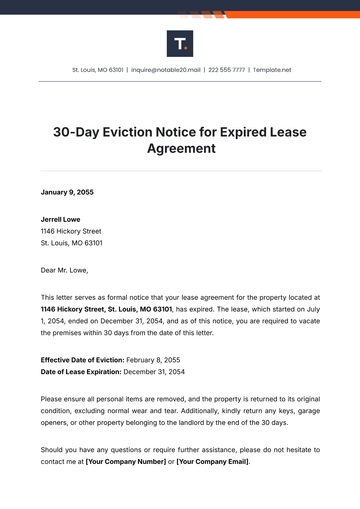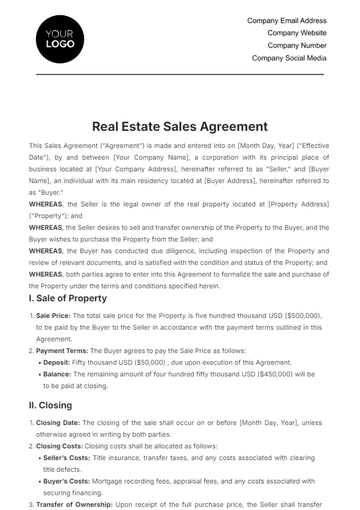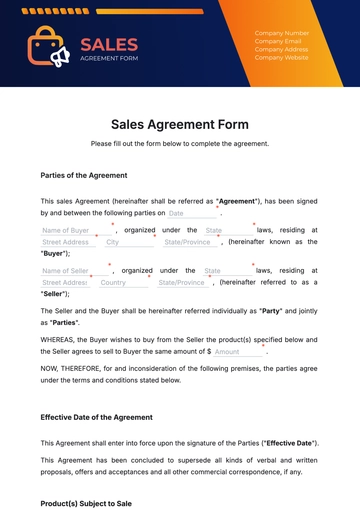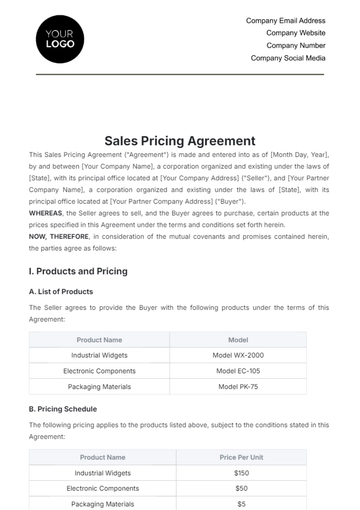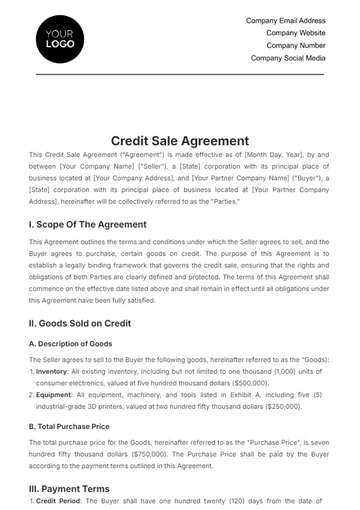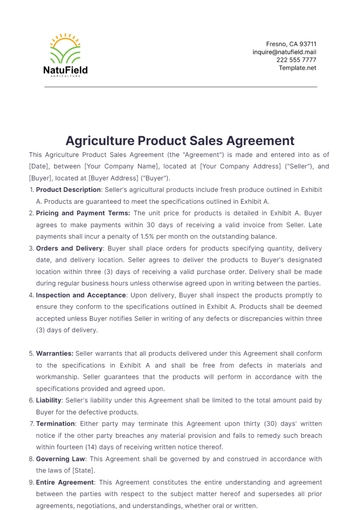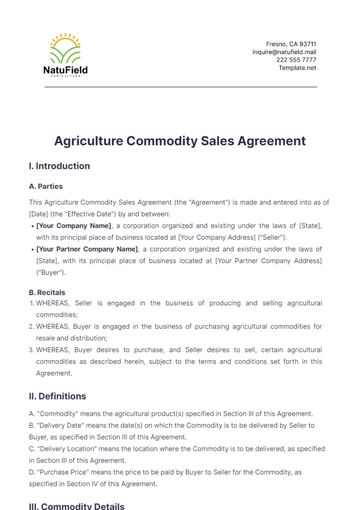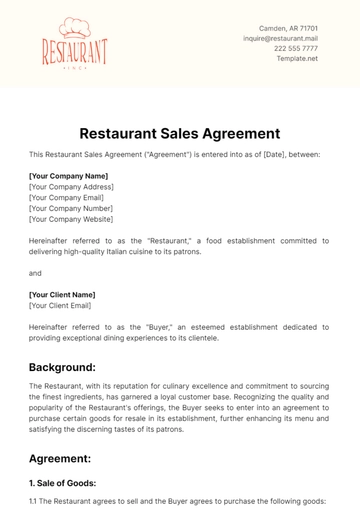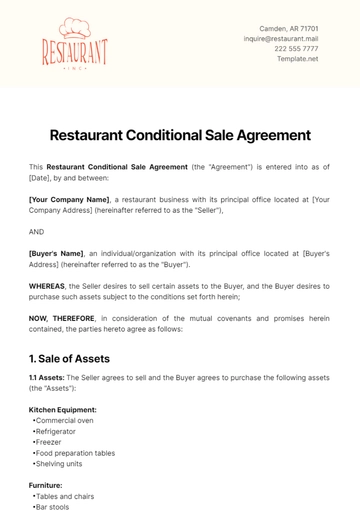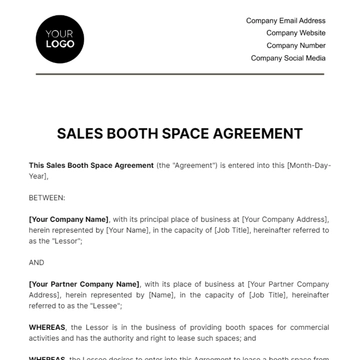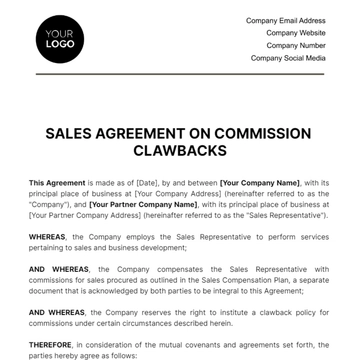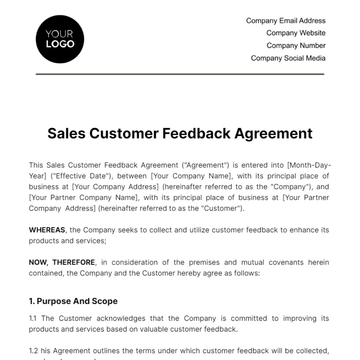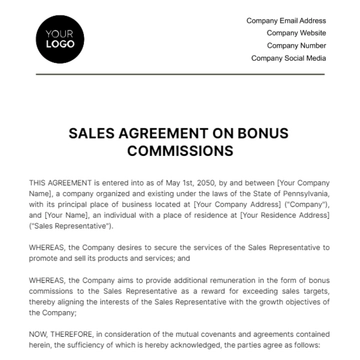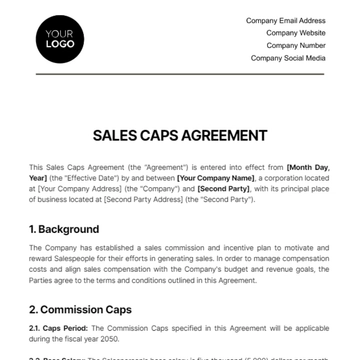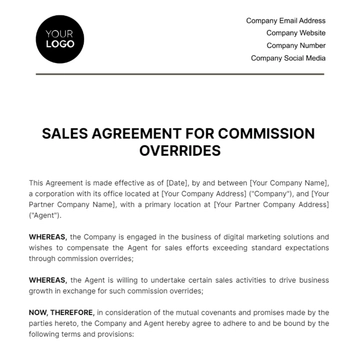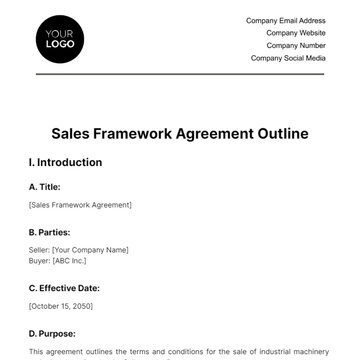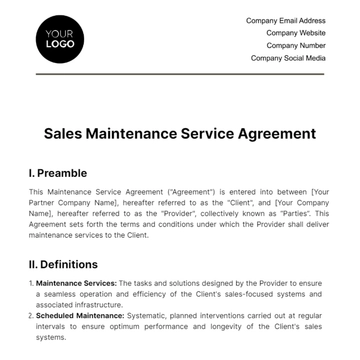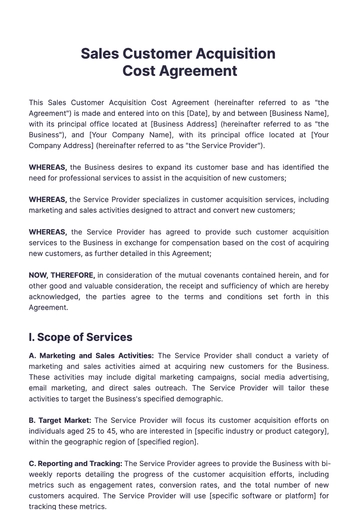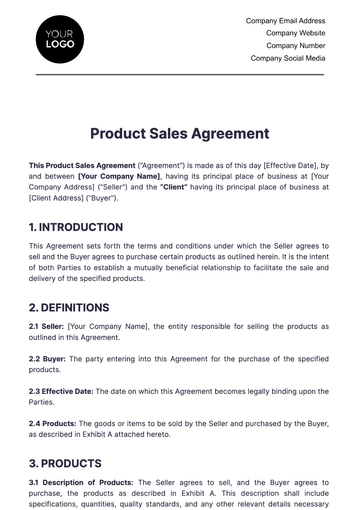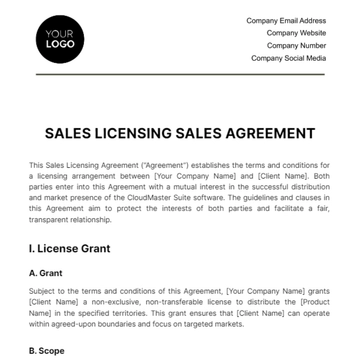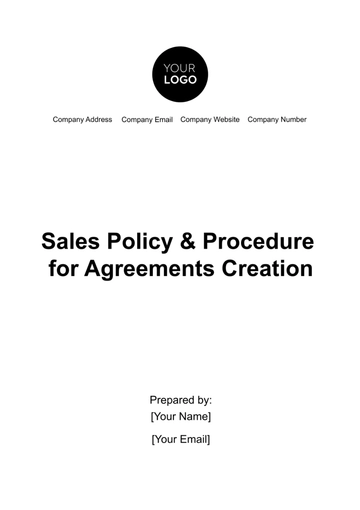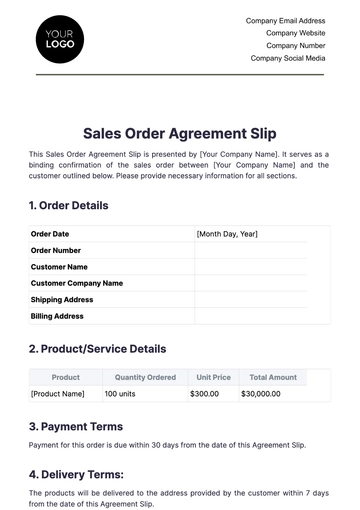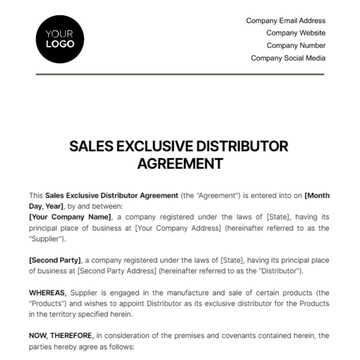Free Sales Handbook on Agreements & Best Practices
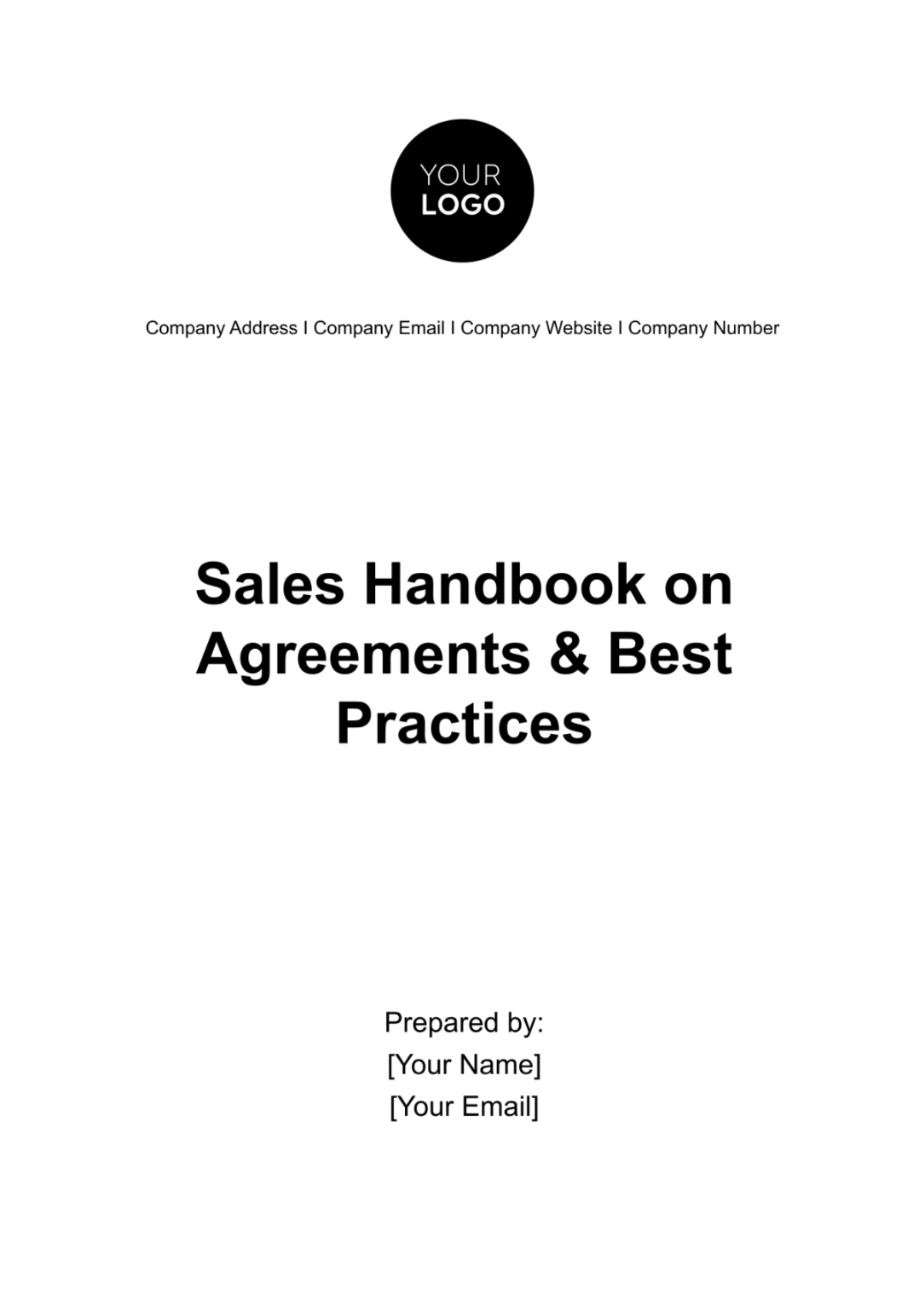
I. Introduction to the Sales Handbook
A. Purpose and Scope
This Sales Handbook on Agreements & Best Practices is designed to provide our sales professionals with a comprehensive resource for understanding and effectively managing various types of contracts. It covers sales agreements, service contracts, purchase orders, and customization of contracts. The handbook also delves into the contract creation process, negotiation, internal review and approval, client communication, risk management, record keeping, best practices, and legal references. It is a practical guide for navigating the complexities of contract management in the sales process.
B. Audience
This handbook is intended for sales representatives, sales managers, and contract administrators. It caters to both newcomers seeking foundational knowledge and experienced professionals looking to enhance their contract management skills. The content is structured to accommodate a wide range of expertise, ensuring that everyone can benefit from the information provided.
II. Understanding Sales Agreements
A. The Role of Sales Agreements
Sales agreements serve as the foundation of sales transactions. They outline the terms and conditions that both parties agree to before entering into a business deal. This section explores how sales agreements establish clarity, define responsibilities, and reduce the risk of disputes. It also highlights their role in strengthening client relationships and ensuring that both parties have a shared understanding of their obligations.
B. Key Components of Sales Agreements
In this part, we dissect the essential elements of a sales agreement, including pricing, payment terms, delivery schedules, warranties, and dispute resolution clauses. Understanding these components is crucial for crafting comprehensive and effective sales agreements that align with the needs of our clients while safeguarding our interests.
C. Best Practices for Sales Agreements
Discover the best practices for creating and managing sales agreements. From using clear and concise language to addressing potential risks, this section offers practical advice for ensuring that your sales agreements are not only legally sound but also optimized for successful business transactions. Real-world examples illustrate the benefits of adhering to these best practices.
Step 1: Drafting the Contract
This stage represents the inception of a contract. In this module, we provide detailed guidance on how to draft contracts effectively. Participants will learn the importance of clear and precise language, defining obligations and deliverables, and specifying timelines. Real-life examples and practical tips will illuminate the path to creating well-crafted contracts that are both legally sound and operationally effective.
Step 2: Reviewing and Editing
Effective contract management hinges on thorough reviews. This section delves into the critical role of reviewing and editing contracts. Participants will gain insights into collaborative review processes involving legal experts, compliance officers, and contract administrators. They'll understand how to identify errors, inconsistencies, and potential risks, making the contract as robust as possible.
Step 3: Finalizing the Contract
This module highlights the importance of finalizing contracts and obtaining necessary approvals and signatures. Participants will learn the significance of timely client communication and ensuring that all parties have executed copies. They'll also explore the creation of a transparent audit trail for future reference and accountability, crucial for sound contract management.
D. Drafting Best Practices
Excellence in drafting is a cornerstone of effective contract management. This topic provides participants with best practices, including the use of standard language, dispute resolution clauses, and contingency provisions. Case studies and examples of well-drafted contracts illustrate the benefits of adhering to drafting best practices, reinforcing the importance of this essential step in the contract creation process.
III. Effective Contract Negotiation
A. Preparing for Negotiations
Successful negotiation starts with thorough preparation. In this module, you'll learn the art of preparing for negotiations. Understanding the client's needs, gathering information about their business and industry, and setting clear negotiation objectives are essential. A well-thought-out plan enhances your negotiation strategy and increases the chances of reaching favorable outcomes.
B. Effective Negotiation Strategies
Negotiation is both an art and a science. In this section, we delve into proven negotiation strategies that lead to successful outcomes. You'll learn the importance of active listening, which allows you to fully understand the client's perspective. Problem-solving techniques help you find common ground and craft solutions that satisfy both parties, ultimately leading to win-win agreements.
C. Handling Client Concerns
Addressing client concerns is a critical aspect of effective negotiation. This module equips you with techniques to handle client objections and concerns professionally and empathetically. You'll learn to diffuse tense situations and transform objections into opportunities for compromise and agreement, strengthening client relationships in the process.
D. Navigating Common Negotiation Challenges
Negotiations can be complex, and challenges often arise. In this part, you'll explore common negotiation challenges, such as price haggling, scope changes, and last-minute revisions. You'll be equipped with strategies to navigate these challenges effectively, ensuring that negotiations stay on track and lead to mutually beneficial agreements.
IV. Internal Contract Review and Approval
A. Significance of Internal Review
Internal review is a pivotal stage in the contract management process. This module underscores the importance of this stage in ensuring that contracts are not only legally sound but also compliant and aligned with our company's policies and objectives. You'll gain insights into how internal review safeguards our interests and minimizes risks.
B. Approvals and Signatures
Understanding the process of obtaining necessary approvals and signatures is vital. This section delves into the individuals or departments within our organization that hold the authority to approve contracts. You'll gain practical insights into navigating the approvals process, ensuring that contracts move forward efficiently and with full authorization.
C. Documentation and Traceability
Comprehensive documentation at every stage is essential for traceability and accountability. In this module, you'll explore the best practices for maintaining clear documentation of the review and approval process. This documentation serves as an audit trail, allowing for easy reference and accountability checks, reinforcing transparency and compliance in the contract management process.
V. Client Communication in Contract Management
A. Clear and Effective Client Communication
Effective client communication is a fundamental aspect of successful contract management. In this module, we delve into the art of clear and effective client communication. You'll learn how to convey complex contract terms in a straightforward manner, ensuring that clients have a thorough understanding of the agreements they are entering into.
B. Addressing Client Questions
Clients often have questions and concerns regarding contracts. This section equips you with the skills to address client questions professionally and comprehensively. You'll learn how to provide clear explanations and address any doubts or uncertainties that clients may have. Building client trust through responsive communication is key to maintaining strong business relationships.
C. Handling Client Concerns and Objections
Client concerns and objections are common during the contract negotiation phase. This module provides strategies for handling these concerns and objections with empathy and professionalism. You'll gain the skills to navigate client objections effectively, transforming potential roadblocks into opportunities for compromise and agreement.
VI. Risk Management in Contract Management
A. Identifying Contract Risks
Effective risk management begins with identifying potential risks within contracts. In this module, we'll explore the common types of risks that can arise during contract negotiations and execution. You'll learn to recognize red flags and potential areas of concern, allowing you to proactively address these issues.
B. Risk Assessment and Mitigation
This section focuses on assessing identified risks and developing strategies for mitigation. You'll gain insights into how to assess the potential impact of risks on the organization and the client. The module provides tools and techniques for mitigating these risks, whether they are related to financial, legal, operational, or compliance issues.
C. Involving Legal Experts
Legal experts play a critical role in risk management. In this part, you'll understand the importance of involving legal counsel in assessing and mitigating legal risks. You'll learn how to collaborate effectively with legal experts, ensuring that contracts are not only legally sound but also aligned with your organization's legal and compliance requirements.
D. Managing High-Risk Contracts
Some contracts pose higher risks than others. This module delves into the unique considerations and strategies for managing high-risk contracts. You'll gain practical insights into due diligence, additional documentation, and monitoring processes to ensure that high-risk contracts do not jeopardize your organization's interests.
VII. Record Keeping and Revision Tracking
A. Maintaining Comprehensive Records
Comprehensive record-keeping is a cornerstone of effective contract management. In this module, we emphasize the importance of maintaining detailed records of all contract-related communications, negotiations, and versions. You'll learn how comprehensive records provide transparency, accountability, and a reliable audit trail for future reference.
B. Organized Record-Keeping
Organized record-keeping is key to easily locating and referencing important contract documents. This section provides insights into how to create a well-organized and structured system for storing and managing contracts. From digital solutions to physical filing systems, you'll discover best practices for keeping your records accessible and secure.
C. Tracking Contract Revisions
Tracking revisions is critical for ensuring that contracts remain accurate and up to date. This module explores the methods and tools for tracking changes, whether it's through version control software, spreadsheets, or other tracking systems. Effective revision tracking prevents errors and ensures that everyone is working from the most recent contract version.
D. Revision History and Transparency
Transparency in revision history is essential for accountability and compliance. This section focuses on maintaining a clear revision history, ensuring that you can trace the changes made to contracts over time. A transparent revision history is a safeguard against disputes and misunderstandings.
- 100% Customizable, free editor
- Access 1 Million+ Templates, photo’s & graphics
- Download or share as a template
- Click and replace photos, graphics, text, backgrounds
- Resize, crop, AI write & more
- Access advanced editor
Elevate your sales team's agreement-making skills with the Sales Handbook on Agreements & Best Practices Template. This handbook offers a wealth of industry insights and best practices, guiding your sales professionals to create agreements that are legally sound, ethically responsible, and beneficial to your business. With this resource, your team can navigate the complexities of agreement creation with confidence and expertise.
You may also like
- Lease Agreement
- Non Compete Agreement
- Rental Agreement
- Prenuptial Agreement
- Non Disclosure Agreement
- Operating Agreement
- Hold Harmless Agreement
- LLC Operating Agreement
- Arbitration Agreement
- Purchase Agreement
- Residential Lease Agreement
- Executive Agreement
- Confidentiality Agreement
- Contractor Agreement
- Partnership Agreement
- Postnuptial Agreement
- Collective Bargaining Agreement
- Loan Agreement
- Roommate Agreement
- Commercial Lease Agreement
- Separation Agreement
- Cohabitation Agreement
- Room Rental Agreement
- Child Custody Agreement
- Employee Agreement
- License Agreements
- Settlement Agreement
- Joint Venture Agreement
- Indemnity Agreement
- Subordination Agreement
- Sales Agreement
- Agreements Between Two Parties
- Business Agreement
- Real Estate Agreement
- HR Agreement
- Service Agreement
- Property Agreement
- Agreement Letter
- Restaurant Agreement
- Construction Agreement
- Finance Agreement
- Marketing Agreement
- Payment Agreement
- Investment Agreement
- Management Agreement
- Nonprofit Agreement
- Software Agreement
- Startup Agreement
- Agency Agreement
- Copyright Agreement
- Collaboration Agreement
- Reseller Agreement
- Car Rental Agreement
- Cleaning Services Agreement
- Consultant Agreement
- Deed Agreement
- Car Agreement
- Equipment Agreement
- Shares Agreement
- Data Sharing Agreement
- Advertising Agreement
- School Agreement
- Franchise Agreement
- Event Agreement
- Travel Agency Agreement
- Vehicle Agreement
- Board Resolution Agreement
- Land Agreement
- Binding Agreement
- Tenancy Agreement
- Exclusive Agreement
- Development Agreement
- Assignment Agreement
- Design Agreement
- Equity Agreement
- Mortgage Agreement
- Purchase and Sale Agreement
- Shareholder Agreement
- Vendor Agreement
- Royalty Agreement
- Vehicle Lease Agreement
- Hotel Agreement
- Tenant Agreement
- Artist Agreement
- Commission Agreement
- Consignment Agreement
- Debt Agreement
- Recruitment Agreement
- Training Agreement
- Transfer Agreement
- Apprenticeship Agreement
- IT and Software Agreement
- Referral Agreement
- Resolution Agreement
- Waiver Agreement
- Consent Agreement
- Partner Agreement
- Social Media Agreement
- Customer Agreement
- Credit Agreement
- Supply Agreement
- Agent Agreement
- Brand Agreement
- Law Firm Agreement
- Maintenance Agreement
- Mutual Agreement
- Retail Agreement
- Deposit Agreement
- Land Purchase Agreement
- Nursing Home Agreement
- Supplier Agreement
- Buy Sell Agreement
- Child Support Agreement
- Landlord Agreement
- Payment Plan Agreement
- Release Agreement
- Research Agreement
- Sponsorship Agreement
- Buyout Agreement
- Equipment Rental Agreement
- Farm Agreement
- Manufacturing Agreement
- Strategic Agreement
- Termination of Lease Agreement
- Compliance Agreement
- Family Agreement
- Interior Design Agreement
- Ownership Agreement
- Residential Lease Agreement
- Retainer Agreement
- Trade Agreement
- University Agreement
- Broker Agreement
- Dissolution Agreement
- Funding Agreement
- Hosting Agreement
- Investor Agreement
- Memorandum of Agreement
- Advisory Agreement
- Affiliate Agreement
- Freelancer Agreement
- Grant Agreement
- Master Service Agreement
- Parking Agreement
- Subscription Agreement
- Trust Agreement
- Cancellation Agreement
- Horse Agreement
- Influencer Agreement
- Membership Agreement
- Vacation Rental Agreement
- Wholesale Agreement
- Author Agreement
- Distributor Agreement
- Exchange Agreement
- Food Agreement
- Guarantee Agreement
- Installment Agreement
- Internship Agreement
- Music Agreement
- Severance Agreement
- Software Development Agreement
- Storage Agreement
- Facility Agreement
- Intercompany Agreement
- Lending Agreement
- Lodger Agreement
- Outsourcing Services Agreement
- Usage Agreement
- Assurance Agreement
- Photography Agreement
- Profit Sharing Agreement
- Relationship Agreement
- Rent To Own Agreement
- Repayment Agreement
- Volunteer Agreement
- Co Parenting Agreement
- HVAC Agreement
- Lawn Care Agreement
- SAAS Agreement
- Work from Home Agreement
- Coaching Agreement
- Protection Agreement
- Security Agreement
- Repair Agreement
- Agreements License
